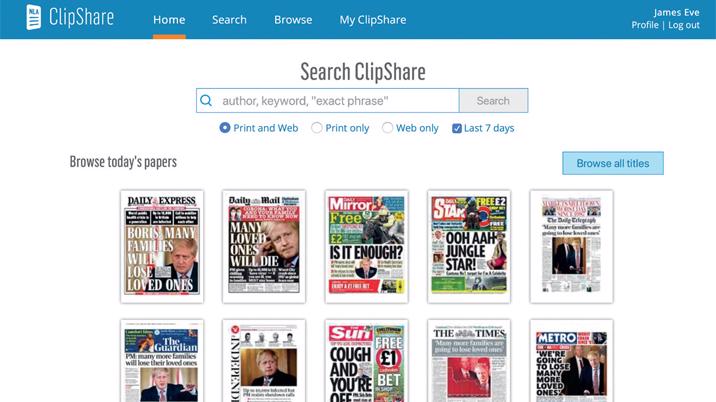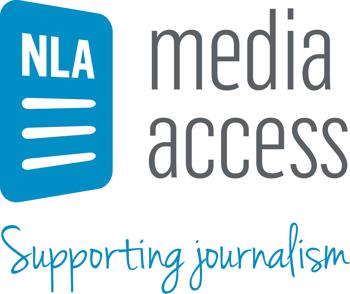
“We have the tech expertise, the scale, the ownership structure, the content – your content – to add considerable extra value to your operations,” says Matt Aspinall, who has recently been promoted to head of publisher partnerships at NLA media access, with a remit now covering NLA’s content databases and the services they support, plus the expansion of NLA partnerships across the publishing industry.
With a bigger team, his mission is to talk to more publishers and create new partnerships, by asking: “what more can we do for you?”.
NLA media access was formed in 1996 as the Newspaper Licensing Agency, but rebranded in 2013 to reflect the fact that magazines is now a major part of its operations, since being recommended by the PPA in 2013 to collect licensing revenues on behalf of magazine publishers too.
The company is owned by the main national newspaper groups and, after costs, all of its revenues are channelled back to publishers: over £40m in 2019, or enough to keep more than 1,000 journalists in work. It represents 7,000 national, regional and foreign newspapers, 1,500 magazines and 4,000 newspaper and magazine websites. It employs 75 people, with its tech and commercial teams based in London and its licensing and finance teams in Tunbridge Wells. The bulk of its revenues come from managing the ten thousand plus companies that pay to use and share publishers’ content. A telesales team in its Tunbridge Wells office sources potential new licensees, calling them up to pose the simple question: “Do you copy or reproduce content?”. If the answer is ‘no’, then they need to sign an agreement to that effect. “We’re constantly finding new businesses that are making copies of your content and benefitting from using that within their business,” says Matt.

When I met up with Matt in their London office, near Blackfriars, it was to talk about the burgeoning suite of publisher services they now offer, over and above their core licensing activity, but it would be remiss not to mention some things that NLA consider blindingly obvious: publishers’ content is valuable, and when it is used by other companies, publishers should be making a fair return out of that activity. Publishers can attempt to collect that money themselves or they can get a licensing body like NLA to collect it on their behalf. If you’re doing it yourself, then it’s worth checking out whether NLA can do it more effectively and efficiently; if you’re not doing it yourself and not using a licensing body, then you might well be missing out on a potentially significant new revenue stream. At the very least, it’s worth having a conversation…
Supporting journalism
The underlying driver of everything NLA media access does is to support journalism. If this sounds too good to be true, remember that the organisation is owned by publishers. It exists to increase our revenues and reduce our costs.
“We have a number of significant skill-sets built up over the years, including technical, commercial contract management and content delivery.”
“Since 2006, when the industry moved from physical clippings to our electronic database, we have invested £20m in our technical expertise and infrastructure. Last year, Paul Lomax, previously of Dennis Publishing, joined as chief digital officer, to further develop our tech capabilities.”
“Our commercial division that manage the relationships with the media monitoring organisations (MMOs), end users and various other partners, are expert at managing complex commercial relationships, contract negotiations, compliance, renewal and reporting.”
“As for content, that is both your and our raw material. Since 2006, we have been taking nightly content feeds from over 200 national and regional newspapers, and since 2015, the websites of the nationals, regionals and various specialist B2B publications too, formatting it, coding it up, creating XML versions and then feeding it out to our clients.”
“These skills enable us to deliver our core licensing services, but also mean that we can offer a range of valuable additional services to publishers.”
So, I ask Matt, in what additional areas can NLA help publishers?
1. Working as your agent…
“NLA has, for some time, supplied content to text aggregators like Factiva, Lexis Nexis and Proquest, on publishers’ behalf. In 2019, we launched our ‘Agent for Publisher’ service, where, in addition to supplying the content, we now offer a full management service (contract negotiation / renewal, royalty collection, compliance and reporting).”
“This relieves the publisher of the burden of doing so and also leads to an improved service because NLA is expert at policing these relationships and enforcing best practice. The publishers benefit from increased transparency and better reporting.”
“Not only will this new service save administrative costs on existing relationships with traditional and long-established text aggregators, but it opens the doors to new revenues, as we look to develop, on behalf of our publisher clients, other aggregator opportunities.”
2. Spotting copyright infringement
“As well as managing legal usage of publishers’ content via our licensees, we are also proactive in spotting and taking down illegal copying. In 2018, our OATS (Online Article Tracking System) service took down over 90,000 articles from websites that were infringing publishers’ copyright. The presence of these articles directly impacts publisher revenues when internet traffic is directed, along with the accompanying ad revenue, to them rather than to you.”
“It’s not just articles that are being copied, but occasionally full sites. We recently identified, and had taken down, a Panama-based website that was blatantly copying the entire output of a well-known UK travel magazine.”
"We are also looking at developing other tools that allow us to look at infringements of your IP to not only include your content but also possibly your logos.”
3. Bespoke technical solutions / new product development
“We are sitting on a huge and ever-growing archive of (your) content, and have the tech skills to slice, dice and output in any number of ways to suit your commercial requirements.”
“There is a good chance that your content is more accessible via our system than it is via yours. If you have a new product idea which relies on reusing previously published content, then that content, certainly in the early proof-of-concept phase, could more easily and cost-effectively come from us.”
“Perhaps, you’re considering a new syndication partnerships with an overseas publisher based on one of your content channels (food, lifestyle, sport), then that syndicated feed might be easier to organise via us, since content feeds is one of our specialisms.”
“We want publishers to think about us when struggling to find a technical solution, because we’re good at handling content. Why not explore with us what bespoke service we can provide for you?”
4. Facilitating syndication
“The output of your top journalists and columnists is much in demand around the world. Our ClipShare service, which is a database of over 40m articles and which is used by over 10,000 journalists daily, is a highly effective shop window for your journalists. Selective, time-limited access can be given to your prospective syndication clients, so they can easily sample your work in a trusted and easy-to-use environment, before agreeing to buy.”
5. Your ideas on how we can make you more money
“We generate royalties for publishers. Last year, it was £40m and the trend is upwards. We are one of the few graphs going in the right direction! Our aim is to grow the services we offer you.”
“Increasing royalties for publishers is our raison d'être and something we’re thinking about all the time, but if you think there are licensing opportunities that we haven’t got covered, or are being under-exploited, then we want to hear about them. By working together, it ultimately results in larger NLA royalties for you.”
What then, I ask Matt, is your main message to publishers?
“Remember our ownership structure. You effectively own us. We exist for your benefit and we’re constantly thinking about how we can grow your revenues. We like to think of ourselves as an extension of your team. It might well be the we can add real value to your next project, in ways you haven’t even thought of yet. A periodic catch-up to talk through your plans would likely throw up opportunities for collaboration that would benefit you.”
“I’m meeting with publishers all the time to see what more NLA media access can do for them. If I’m not yet in your diary, then do get in touch to ask me, “what more can you do for us?” I look forward to telling you…”
Other ways NLA supports journalism
- Helping the visually impaired: NLA has been working with RNIB for nearly ten years. Publishers who make use of the NLA’s database service have the ability to ‘opt in’ to an XML feed delivery service that NLA manages daily to the RNIB, helping them provide a wide range of popular and specialist newspapers and magazines in accessible format through their Newsagent service.
- Extending diversity in the newsroom: NLA was instrumental in the creation of the Journalism Diversity Fund in 2005 to support would-be journalists from socially and ethnically diverse backgrounds, and NLA continues to donate to the fund every year. It is vital for the industry’s sustained success that the journalists reporting the news reflect the communities in which they serve. Run by the NCTJ, they recently announced plans for additional funding from the wider media industry to keep up with the demand for bursaries.
It’s important that RNIB customers, who are unable to read standard print anymore, can select and read a range of newspapers and magazines for their leisure or professional needs. NLA provides over 100 titles through a live feed that RNIB then converts into accessible editions that are delivered both digitally and by the postal service on CD, USB stick and braille.
Feedback from the RNIB indicates what a lifeline the service is to their customers, enabling them to continue to read the national and local news.

NLA media access
16-18 New Bridge Street, London, EC4V 6AG
Matt Aspinall, Head of Publisher Partnerships
Tel: 020 7332 9350
Email: maspinall@nla.co.uk










